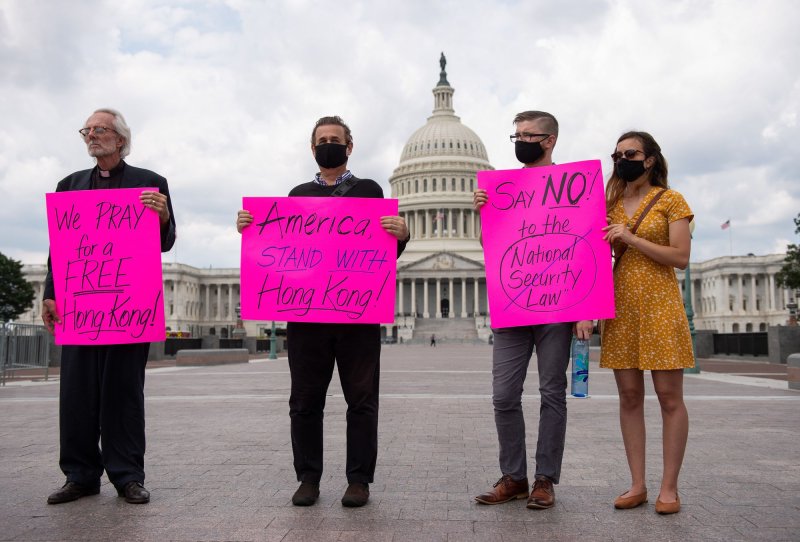Activists hold a protest against China's adoption of a new national security law on Hong Kong at the U.S. Capitol in Washington, D.C., on Wednesday. Photo by Kevin Dietsch/UPI |
License Photo
July 2 (UPI) -- The Republican-controlled Senate on Thursday unanimously passed bipartisan legislation to punish China for imposing a new sweeping national security law on Hong Kong, sending the bill to President Donald Trump's desk to be signed into law.
Co-sponsored by Sens. Pat Toomey, R-Pa., and Chris Van Hollen, D-Md., the bipartisan Hong Kong Autonomy Act will impose mandatory sanctions on persons and entities who contribute to China's defiance of its responsibilities to Hong Kong and those who infringe upon its autonomy as well as banks that conduct "significant transactions" with those people.
The Senate passed the bill days after China imposed a draconian national security law that critics say will be the end of Hong Kong's autonomy, which the Asian nation promised to maintain for 50 years after the former British colony was returned to Chinese rule in 1997.
Critics say the law, which criminalizes acts of secession, sedition, subversion, terrorism and working with foreign agencies to undermine the national security of the People's Republic of China in Hong Kong, was imposed to crack down on dissent as the region has been subsumed by yearlong destabilizing pro-democracy protests.
Toomey told lawmakers Thursday that the national security law is part of a growing campaign by China to snuff out freedoms and dissent in Hong Kong before they can spread to the mainland and threaten the Chinese Communist Party's rule.
In the first day that the law was in place some 300 protesters were arrested, some of whom on charges under the new law that criminalize having Hong Kong independence material as threatening to national security.
Toomey said by arresting a 19-year-old man for having such a sticker on his phone and a 15-year-old girl who was detained for flying a pro-independence flag China was telling its own people no one is safe.
"That's the message that Beijing wants to send to the people of Hong Kong: 'We can arrest you, we can imprison you if you don't behave,'" he said.
His law, he said, responds to this aggression by creating "real penalties" for those in the Chinese Communist Party deemed responsible and also broadcasts to the Asian nation that they will stand up against it.
"The bill is a larger signal to China, it's a message that the United States and the free world are no longer willing to look past some of the worst behavior that has been occurring," he said. "It's a message our patience has run out."
The Senate vote came a day after the Democratic-controlled House passed the bill and amid fraying relations been Washington and Beijing as the Trump administration has repeatedly chastised the Asian nation over its human rights record.
Despite widespread condemnation for Western nations, China has maintained its stance that the issues of Hong Kong are only China's concerns.
The Senate's passing of the bill is expected to further deteriorate their relations.
After it passed the House, China said no foreign country has the right to interfere and U.S. attempts to prevent China from implementing the national security law "are doomed to fail."
"We urge the U.S. side to grasp the situation, abide by international law and basic norms of international relations, stop interfering in Hong Kong affairs through any means, stop pushing the negative bill or even signing it into law or implementing it. Otherwise, China will react strongly and the U.S. shall bear all consequences," China's Foreign Ministry spokesman Zhao Lijian said Thursday.















